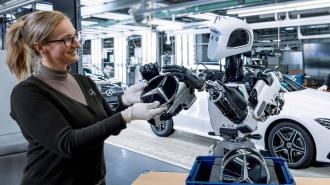Workers at Mercedes-Benz manufacturing plants will soon be joined on the factory floor by Apollos, humanoid robots designed to take over dull, repetitive, and physically demanding tasks.
Workers of the future: Car manufacturing has long been at the forefront of industrial robots. But traditionally, manufacturers have had to design a new robot for every task they wanted to automate — one robot might weld two parts over and over again, for example, while another might move parts from one part of the assembly line to another.
Humanoid robots could upend this paradigm. Because they are, by definition, modeled after the human body, one robot could potentially carry out many different tasks currently handled by human workers.
“When we set out to build Apollo, an agreement like the one we’re announcing today with Mercedes-Benz was a dream scenario.”
Jeff Cardenas
What’s new? Developing humanoids has been a huge engineering challenge, but several robotics firms believe they now have bots that could make a major difference in the workforce, including Texas-based startup Apptronik.
In August 2023, the company unveiled its Apollo robot, a 5’8”, 160 pound humanoid capable of carrying up to 55 pounds. Now, it has announced a deal with Mercedes-Benz that will see Apollo robots deployed at the automaker’s manufacturing facilities.
“When we set out to build Apollo, an agreement like the one we’re announcing today with Mercedes-Benz was a dream scenario,” said Jeff Cardenas, co-founder & CEO of Apptronik.
The details: According to the Financial Times, an undisclosed number of Apollo robots will be deployed at a Mercedes-Benz manufacturing plant in Hungary, where the automaker is dealing with labor shortages.
The robots will have two jobs at first. One will be inspecting assembly kits while bringing them to workers. The other will be delivering totes of already-assembled parts to workers farther down the manufacturing line.
Apptronik and Mercedes-Benz will also work together to identify additional tasks for Apollo robots to tackle in the future.
“We are exploring new possibilities with the use of robotics to support our skilled workforce in manufacturing,” said Jörg Burzer, head of production, quality, and supply chain management at Mercedes-Benz.
“This is a new frontier,” he continued, “and we want to understand the potential both for robotics and automotive manufacturing to fill labor gaps in areas such as low skill, repetitive, and physically demanding work and to free up our highly skilled team members on the line to build the world’s most desirable cars.”
We’d love to hear from you! If you have a comment about this article or if you have a tip for a future Freethink story, please email us at [email protected].






